Climate Governance in the Philippines
Attachments

The CAT Climate Governance series seeks to produce a practical framework for assessing a government’s readiness - both from an institutional and governance point of view - to ratchet up climate policy and implement adequate transformational policies on the ground, to enable the required economy-wide transformation towards a zero emissions society.
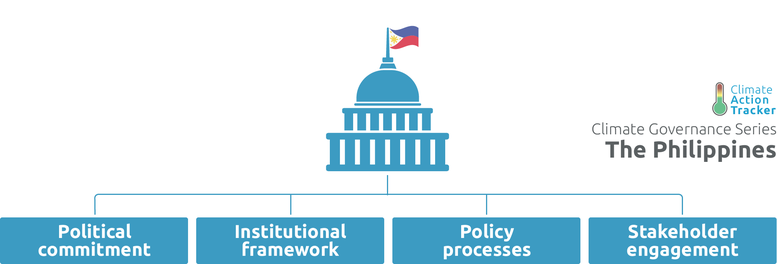
Our methodology
We have set up a framework that assesses and scores a number of indicators, where we rate various aspects of governance. This allows us to establish a common basis on which to compare climate governance across countries as well as identify areas of improvement and highlight positive developments. We have applied this framework at both a national level and on key emissions-intensive sectors of the economy. In the Philippines case we have focused on the electricity supply and transport sectors.
For the purpose and overview of this series, see our Climate Governance series main page. The methodology framework used in this assessment is here. For more detail on our methodology, see here: methodology page.
Assessment of national level readiness
There is room for improvement in the Philippines’ political commitment to climate mitigation. The President has yet to turn the words of his Fourth State of the Nation speech --- on fast-tracking renewable energy and cutting coal usage -- into action, as well as to increase the attention he pays to climate mitigation overall.
The Philippines has played a leadership role on climate change internationally, including in securing the 1.5°C temperature limit in the Paris Agreement. However, it could bolster this position by undertaking and showcasing domestic mitigation efforts.
The Philippines has a dedicated agency - the Climate Change Commission (CCC) - and a high-level group within the executive tasked with climate mitigation. It exhibits a moderate level of effective coordination between government agencies and coverage across line ministries.
Overall, there is decent continuity in the country’s climate institutions and policies. However, the government’s current efforts to strengthen its institutional capacity to deal with disaster resilience should not be at the expense of maintaining a bespoke entity to deal with climate mitigation. The Cabinet Cluster on Climate Change Adaptation, Mitigation and Disaster Risk Reduction could be strengthened by reintroducing an explicit objective to focus on mitigation efforts into its mandate.
There is much the Philippines could do to strengthen its institutional framework to support the transition to a zero emissions society. All relevant line ministries should appoint a high-level climate change focal point with a clear mandate to pursue mitigation activities. Enhancing the coverage of climate change within line ministries will bolster the ability of the Commission to effectively coordinate climate mitigation activities, as would ensuring it has sufficient financial and human resources to support its work. More research on deep decarbonisation pathways is needed. This analysis should be regularly considered and heeded by the government.
The Philippines has made progress in establishing an enhanced transparency framework, but the nation urgently needs a defined Paris-compatible decarbonisation pathway. Work is underway to update its NDC by 2020; however, this process has not been formalised into a permanent mechanism to ratchet-up mitigation efforts.
The Philippines’ level and scope of engagement of non-state actors is positive. Climate change-related content is publicly available, and there is some effort to include stakeholders during policy development. Yet these efforts are hampered by the poor management of non-state actors’ interests. More needs to be done to ensure a just transition than simply a focus on promoting green jobs.
Rating system
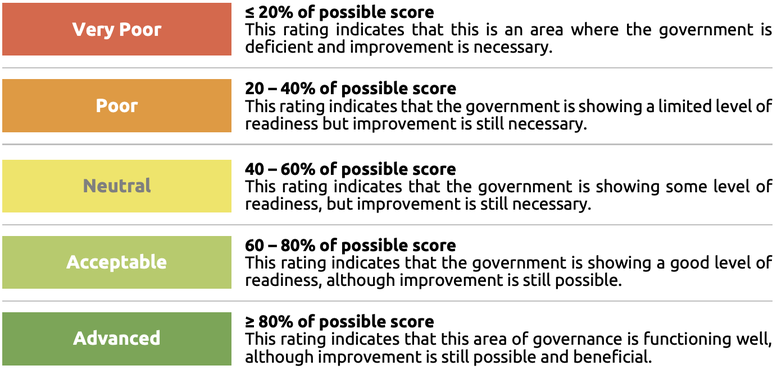
We analyse ten different criteria of governance under four categories that cover the key enabling factors for effective climate action. We give each a rating as outlined above (poor - neutral - advanced). The methodology framework used for this assessment is here. For more detail on our methodology in general, click the link below.
Ratings and Recommendations
The following section outlines the results of the analysis for each of the different categories and criteria as well as our recommendations for each category of governance.

- Scale up leadership advocacy for climate change mitigation and make it an explicit and distinct focus of the Cabinet Cluster.
- Turn the words of the 2019 State of the Nation address on fast-tracking renewable energy and cutting coal usage into action through active political support for a transition from coal to renewable energy.
- Maintain and strengthen an institution, such as the Climate Change Commission, with a dedicated focus on climate mitigation and full decarbonisation, and increase its influence on line ministries.

- Increase coordination and policy alignment between line ministries and the Climate Change Commission.
- Appoint a high-level climate change focal point - in all relevant line ministries - with a clear mandate to pursue mitigation activities.
- Undertake research and analysis of Paris-compatible emission reduction pathways.
- Reverse the significant reduction of the Climate Change Commission’s budget.

- Define a Paris-compatible decarbonisation pathway to guide mitigation action.
- Make data and reporting available on the National Integrated Climate Change Database and Information Exchange System in a timely manner.
- Establish a permanent mechanism to ratchet-up climate action, building on current efforts to revise its NDC.

- Develop a plan or strategy for a just transition to a zero emissions society by building on the work done to date to promote green jobs.
The Philippines Climate Governance
These tables from the report give an overview and analysis of the key factors of the Philippines governance to enable effective climate action. We look at the country's key institutions, strategies, targets and legislation, as well at a sectoral level for the electricity supply and transport sectors.
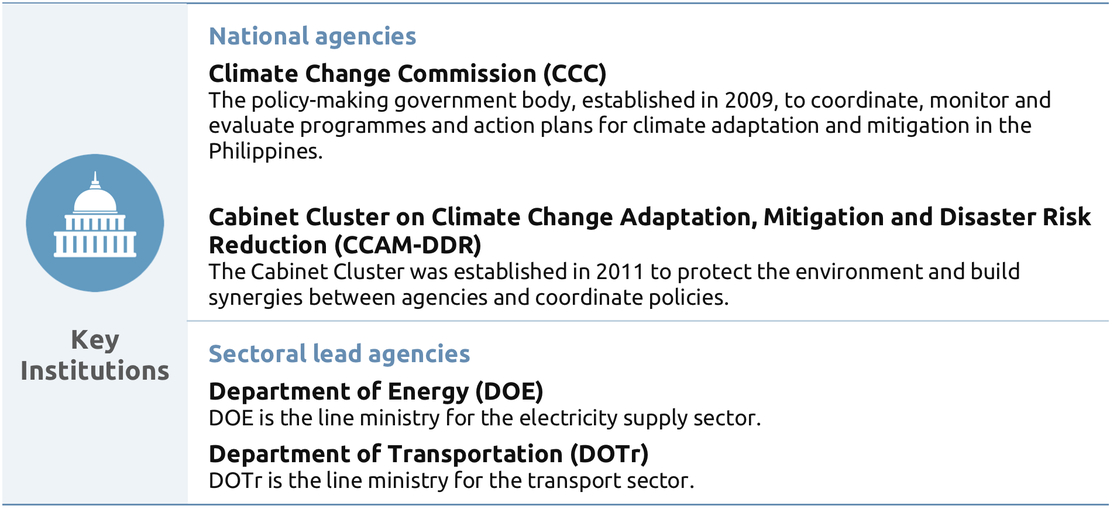
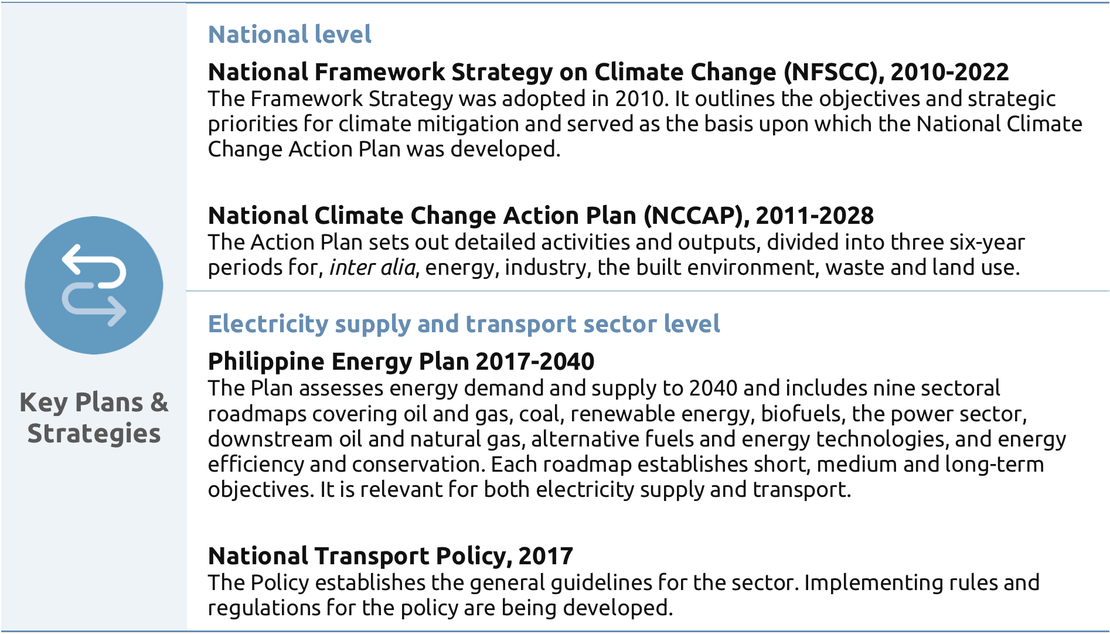

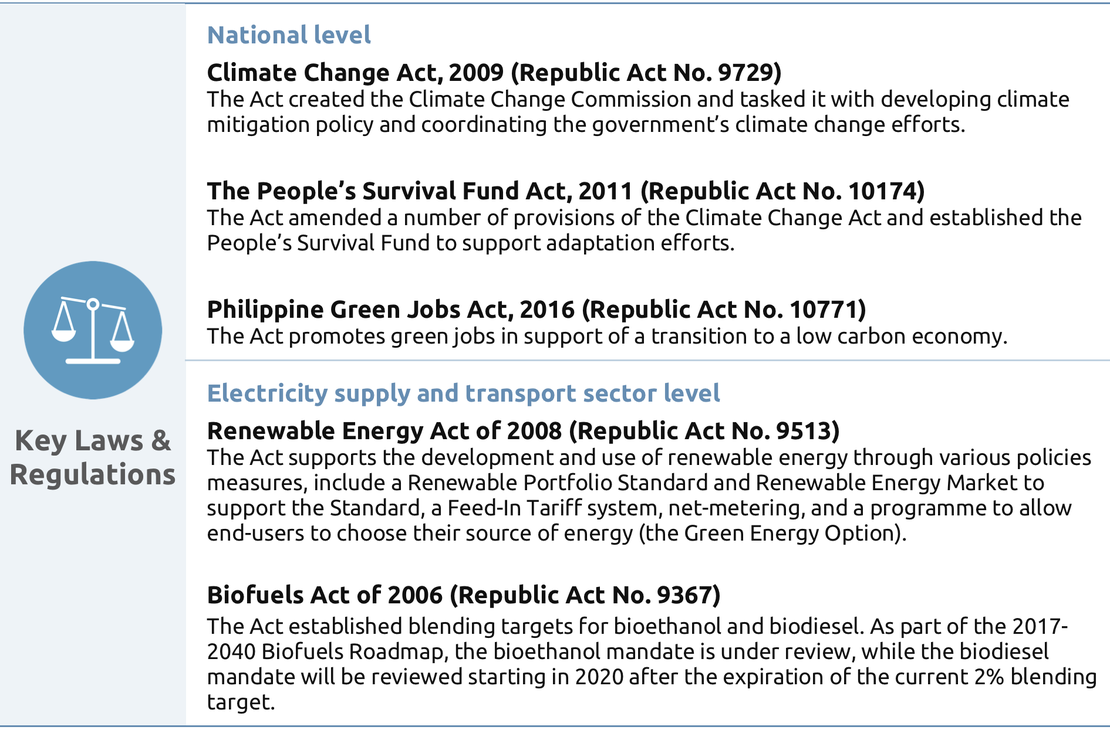
Assessment of sectoral level readiness
The report also assesses the readiness of the Philippines electricity supply sector and transport sector. See the report for details.
Other reports
Stay informed
Subscribe to our newsletter